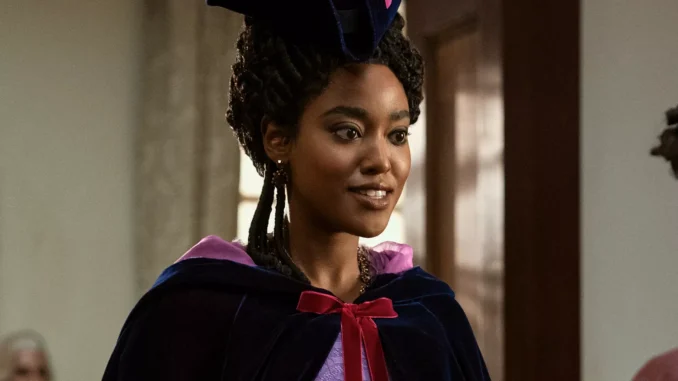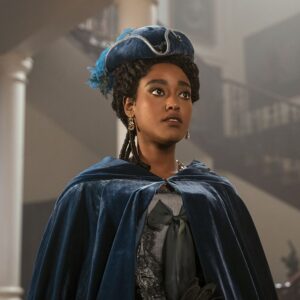
“It becomes so crystal clear that this is a woman who stands alone by choice,” Thomas tells EW.
There is no one fiercer in the tone than Lady Danbury.
The beloved Bridgerton character has faced down everything from meddling mamas to fluffy corgis and then some. A widow with the power to turn the Queen’s head, she’s a force to be reckoned with. But how did she become that way? Was she always this fierce and self-possessed?
That’s part of what Queen Charlotte: A Bridgerton Story aims to reveal to audiences, as we trace the young Agatha (Arsema Thomas) from her days enduring her husband Herman (Cyril Nri) and his enthusiastic bedroom activities to her status as the worst bitch in the ton. The Lady Danbury we meet here is far more uncertain and adrift than the elder version as portrayed by Adjoa Andoh on Bridgerton.
For Thomas, the moment Agatha truly steps into herself is a scene in the finale where she rejects a marriage proposal from Charlotte’s brother Adolphus (Tunji Kasim), realizing that she doesn’t wish to marry again. She gives a powerful speech, declaring her dedication to her widowhood.
“She’s realizing [these things] for the first time in the moment,” Thomas says. “I don’t think she even thought a woman could say these words or that anyone else has thought it. In that moment, it’s like verbal diarrhea, because he’s pressing her and she’s realizing, ‘Actually no, what you’re serving is not what I want to eat. I’d rather cook for myself.’ It becomes so crystal clear that this is a woman who stands alone by choice.”
However, it’s an arduous journey to Agatha’s moments of empowerment and reflection. One that includes losing a husband, befriending a queen, gaining a title, and finding herself in the crosshairs of palace intrigue. We called up Thomas to spill the tea on Lady Danbury’s secrets.
ENTERTAINMENT WEEKLY: Was the Bridgerton version of Lady Danbury and the work Adjoa had already done a starting point for you?
ARSEMA THOMAS: For the actual work that we started to do on set, it wasn’t. I’d watched it to understand the world and to understand this character’s view on the world, but then when I got the script for Queen Charlotte, I realized that it doesn’t help, actually, to know where I end up because she starts in such a different place that I had to throw everything that I knew out the window. Together, Adjoa and I sculpted this backstory so that we both had the same jumping off point.

Did she give you any pointers or things that helped you understand the character?
I wanted to know about how Agatha likes to wear her hair. Why is it always slicked back and in this bun? Adjoa discussed with me how she doesn’t like anything to be in her face. She’s not this soft woman. She wants to be taken seriously, and she doesn’t want anything to distract from it. There was something amazing in seeing then the change visually that Agatha starts to make over the season that mirrors the emotional growth that she’s going through. We also had the same idea of how she was brought up. There’s this strong sense of African-ness in her, the spirit of a liberator and a revolutionary runs through Agatha.
We see her say she loathed her husband and we do see what Agatha endures. But in terms of your own approach, does she hold any affection for Herman? When he died, there seemed to be some true sense of grief.
There is obviously grief in a loss. She has lost somebody. This is the person that has been by her side for a really long time. It is the face that stares back at her when she sees her children. There is a companionship that they had lost when he passed, but she loathes him for representing this idea of marriage that had imprisoned her for so long. She didn’t even realize that she could have a chance to make a decision until he is dead. She is extremely frustrated because she had no say in any of it.
We’ve seen a lot of very sexy scenes on Bridgerton, but you have some of the funniest sex scenes where she’s lying back and thinking of England. What was it like filming those?
They were actually quite fun because it was a moment where I got to zone out. As an actor, you always have to be so on, so to be able to daydream and think about, “Oh, I wonder what I’m going to eat when I get home. Do I actually have groceries? F—, there’s no more pasta.”
How torn is Agatha between elevating herself and trying to take advantage of this relationship with the Dowager versus honoring Charlotte as someone who can understand her life situation and this friendship that is budding between them?
She’s extremely torn because in order for her to do one, the other must be achieved. If she doesn’t have land, she will be homeless, so she’s definitely not going to have access to the queen then.